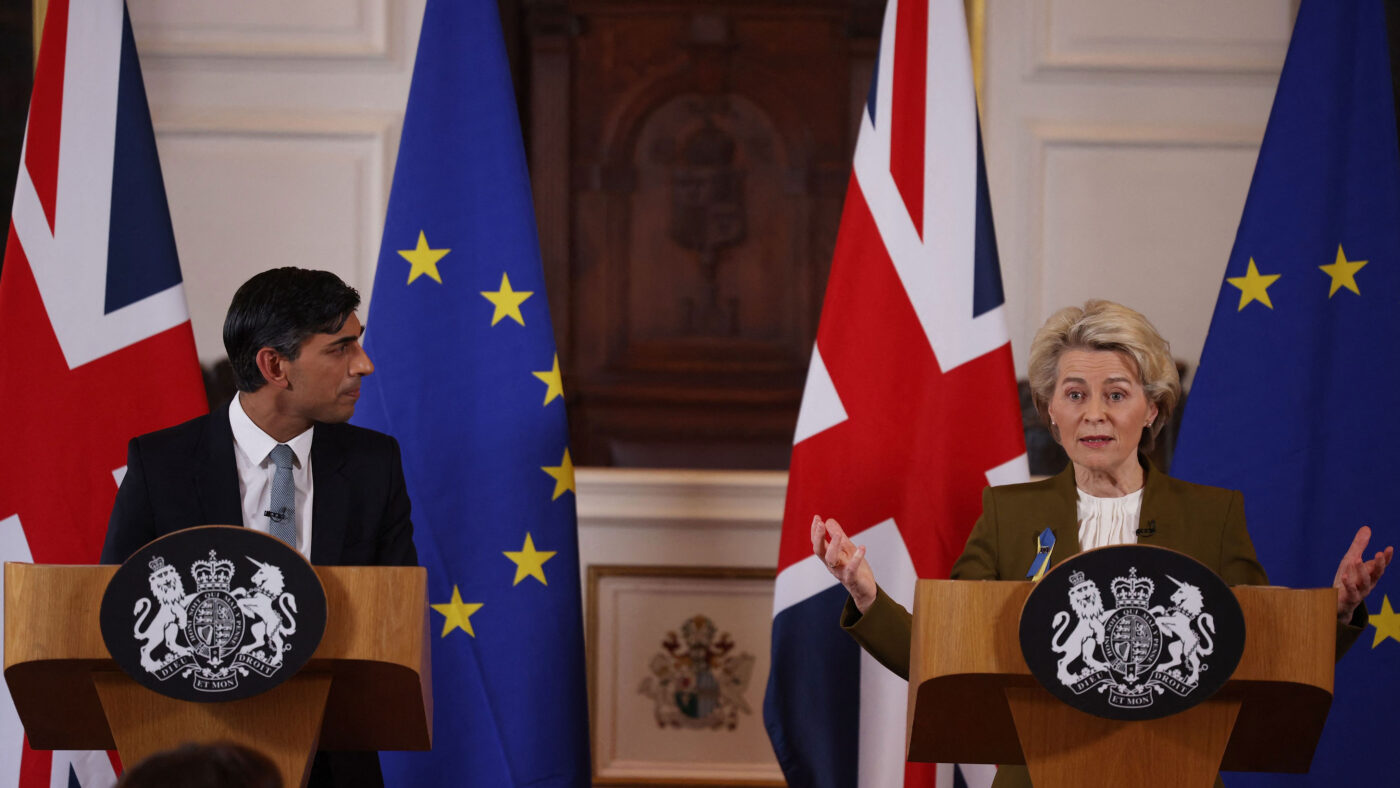Do you remember the Windsor Framework? It was an agreement between the UK and the EU that Rishi Sunak sealed in March that was supposedly going to end ‘any sense’ of a border in the Irish Sea.
Spoiler alert. It didn’t.
The agreement was touted as a benefit to Northern Ireland that would remove the problems created by Boris Johnson’s Northern Ireland Protocol, but almost every day new detail emerges about the ways in which it will separate the province economically from the rest of the UK. Marks & Spencer, along with other supermarket chains, warned at the weekend that the Framework would not fix issues with the Irish Sea border.
Even in Ulster, there is little appetite to discuss the difficulties with the deal. It’s been sold as a solution to all our problems, including the DUP’s boycott of the power-sharing executive at Stormont. But as it is being put in place through new legislation by the Government, it will soon be impossible to ignore its flaws.
You are unlikely to have heard, for example, of the Postal Packages (Miscellaneous Amendments Regulations) 2023. The very mention of such an obscure piece of secondary legislation is likely to put most people to sleep.
In this case, though, these new rules turn anyone sending a parcel to Northern Ireland from Great Britain into an exporter. The law puts the words ‘and GB-NI postal packets’ after all mentions of ‘foreign postal packets’ in the original Postal Services Act.
That means that any parcels for Northern Ireland are to be treated as if they were being sent to a foreign country. In an answer to a question by Baroness Hoey in the House of Lords, the Government said ‘parcels can be sent to friends and family as smoothly as today’, but the regulations in fact imply that my five-year-old’s uncle needs to complete a customs declaration to send him a toy for his birthday,
Now, you may not care about that, but remember what the Prime Minister said in February about ‘any sense of a border’. Does it really sound like that is the case?
The Foreign Secretary, James Cleverly, told a Lords’ committee recently that a requirement to place ‘Not for EU’ labels on all Northern Irish produce would be extended to the rest of the UK. While that was a problem in itself, the rules – when they were eventually published – said nothing of the sort.
The labelling requirements will apply only to Northern Ireland, and supermarkets now say that will lead them to send goods through the ‘red lane’, which features a full range of customs formalities. They may be extended to the rest of the UK in 2024, following a consultation and, you will note, after the Conservative government is likely to be replaced by a Labour administration.
While even supermarkets now look increasingly unlikely to use the ‘green lane’, University of Ulster economist Dr Esmond Birnie says that 75% of purchases by manufacturers will have to go via the red lane.
I’ve spoken to people in the haulage industry in Northern Ireland and they are alarmed by the changes that are approaching. They have been trying to get information from the Government, but civil servants are evading their questions.
There is still no definitive list of which goods can and cannot go through the green lane, even though the system is supposed to be in operation by October. Neither do companies know what measures will be taken if goods are declined for that lane.
Very often, companies supply the whole island of Ireland through ports in Larne and Belfast. If they’re obliged to mark their goods ‘Not for EU’, that makes their operations unviable. They will simply stop selling to the island. Many mail order companies, who are now required to fill in customs paperwork and potentially even pay duties, are likely to do the same.
At the moment the effects of the Northern Ireland Protocol are tempered by ‘grace periods’ put in place by the Government. These were imposed because the arrangement was not going to work for a region so inextricably interlinked with the rest of the UK’s economy. They kept food on the shelves and allowed parcels and medicines to arrive. Soon, these measures will be stopped, thanks to the Framework.
Rather than achieving something positive. Rishi Sunak has effectively dismantled the safeguards that kept the Irish Sea border, just about, operating. Either he has been hoodwinked by the EU, or he has taken these steps deliberately.
For the rest of the UK, this may seem unimportant, but it is significant. The only way that the Protocol and Framework can work is if the whole country is in much closer alignment with the EU. There is an argument that that is necessary, but it has not been made openly.
The Northern Ireland Framework is, at its heart, a chimera. Rishi Sunak should tell the truth about its effects, and his attitude to the whole UK’s relationship with the EU.
Click here to subscribe to our daily briefing – the best pieces from CapX and across the web.
CapX depends on the generosity of its readers. If you value what we do, please consider making a donation.


